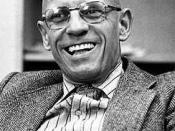The ideas of confession that Michel Foucault states in The History of Sexuality can be used as a lens in order to analyze confessional fiction. The ideas of a power relationship between the listener and the speaker, the futility of truth, and the glorification of the knowledgeable self are definite traits of the Foucaultian confession. These, by implementing the theory of confessional fiction that Brooks implements and by employing these ideas can be used to analyze a definite relationship between the confessant and his confession. However, the idea of the confesant expounding upon truth is a futile one and leads into an infinite regression of truth and lies, as is in a similiar case when one tries to identify truth with the unreliable narrator of confessional fiction. Instead of searching for an ultimate truth within the story, the critic must look for how the self emerges as a narrator and entity in the story.
The critic must first demystifiy all notions concerning the credibility of the unreliable narrator. The truth as shown by the unreliable narrator is merely a mask that the narrator wears. The unreliable narrator and confessor merely gains power by telling and thus creating his own spoken story. Indeed, the confessor or unreliable narrator's self has a definite relationship to the story and its creation. The narrator is in fact the ultimate propignator of the story in question. In the story itself, therefore, metaphors in the story must be garnered in order to come to the conclusion of a slowly emerging self as the story progresses. In creating the story, the narrator slowly identifies with the reader as an emerging creator. Therefore, the truth of the self becomes the only reality of the confessional story. In such stories where the main created character becomes the narrator, he...


